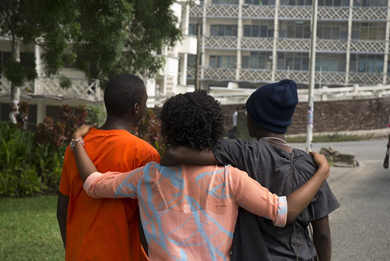By Sarah Lockwood
Sarah Lockwood is a concerned parent and former social worker. Having worked with the public for decades and after watching her own daughter struggle with addiction, Sarah knows all too well the devastation that can be caused by drug and alcohol abuse. Sarah’s daughter is now in recovery, but her experiences with substance abuse inspired Sarah to get involved with ThePreventionCoalition.org. She plans to spread awareness and support through her work for others dealing with addiction. While Sarah devotes a lot of time to the Coalition, she makes sure to relax and enjoy the small things in life, as every day is a gift.
We all know growing up is not easy. Thankfully, the close connections built in high school and college help young adults survive the hard times and can even shape their personalities and lifestyles through adulthood. Part of the reason adolescents become so close to friends during those years is because they aren’t quite as guarded as people tend to be later in life. The tight bonds created with friends serve as powerful forces that impact choices, behavior, and attitudes. They can also provide valuable support systems for the tumultuous teenage years. Sometimes these friendships may even last a lifetime.

The Importance of High School Bonds
There is so much change in high school. Many things are happening with teenagers’ bodies and brains: they experience crushes, deal with the stress of school and parents, and make choices about drugs and alcohol.
Everyone stumbles through those awkward years trying to find their way in life and figure out who they are. One thing is for sure: a lot of growth and change occur during adolescence. On the last day of high school, graduates aren’t the same person they were on the first day of middle school.
In Adolescence, Bonds with Friends Often Carry More Weight Than Family Values
Adolescents often want to spend more time with friends than their families because they feel they can relate better to people who are close to their own age and experiencing many of the same things. Teens are influenced by their friends in this way — acting similarly, wanting to wear similar clothes, having certain attitudes, and possibly experimenting with drugs and alcohol.
Whether positive or negative, close friends tend to have a greater influence than other peers. This is especially true in terms of choices such as alcohol use, drugs, and smoking. Generally, if a friend drinks, their close friends are more likely to drink; if close friends abstain from alcohol, others in their circle are less likely to drink. Best friends support one another through the good and the bad as they navigate through the teenage years and into young adulthood together.
College Connections
Leaving for college for the first time means that these new graduates, now young adults, no longer have their parents constantly guiding them or checking in. That’s one reason why supportive friends are an important part of one’s social life during this period. These friends actually turn into students’ families during college. It’s the first time many students have had real freedom, and they experience that freedom being around their friends most of the time. They may stay up all night with a close friend while she cries about a failed romance, or help each other study for an upcoming exam. Much like high school, friends are also influential when it comes to alcohol and drugs during college. During this period, friends are everything; they are often the closest bonds students will ever make and sometimes the entire support system.
The Future
Close friendships are important in life, but they’re of utmost importance as young people grow and make their way into the real world for the first time. So many changes occur during those years that a strong support system is the foundation on which young adults build their futures. Whether positive or negative, a young person’s closest friends are often those who will help lead them down the paths to who they will become.
What Parents Can Do
Because the influence of friends can be so strong, parents should keep an eye on their child to look for warning signs that he or she may be in a negative peer group. Receiving mysterious phone calls at strange hours, a sudden drop in school performance, truancy, and increased time on the computer may all point to a problem. He or she also may suddenly have a shift in personality, becoming more withdrawn, sullen or secretive in addition to major changes in wardrobe, makeup, interests, mannerisms, tone, and inflection.
If your child is exhibiting these signs, strike up a non-judgmental, non-confrontational conversation. Say that you’ve noticed a change in habits and wonder what brought it on. Don’t draw assumptions, accuse new friends of being the problem, or criticize. Focus on tangible problems — failing grades, for example — and ask open-ended questions to get a better understanding. Sometimes simply showing your child you notice what’s going on and care about his or her well-being can make a big difference.